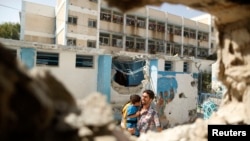United Nations schools in the Gaza Strip have sheltered some 270,000 displaced Palestinians during the current hostilities between Israel and Hamas militants.
At least six schools were recently shelled, leading to dozens of casualties and tensions between the U.N. and Israel. The U.N. has also found rocket caches belonging to armed groups in three of their schools, raising questions about how they got there.
UNRWA, as the agency is known, is one of the largest and oldest U.N. programs. It has operated in the Israeli occupied territories of the West Bank and Gaza for 60 years, as well as in Palestinian refugee camps in Jordan, Lebanon and Syria, providing schooling, vocational training, health care and social services to 5 million Palestinians.
UNRWA has a staff of over 30,000 — most of them from the refugee population. In the current conflict, 11 staffers have been killed.
Over 90 percent of UNRWA’s annual budget comes from U.N. member states. Before the current round of hostilities leveled parts of Gaza, UNRWA had budgeted $1.4 billion for this year and next. That number will now have to be revised to reflect reconstruction needs.
UNRWA’s schools have been in the news recently, because they are housing so many displaced Gazans. As U.N. facilities, they are protected under international humanitarian law as safe zones, but on six occasions they have come under direct fire that killed and wounded civilians.
U.N. Secretary-General Ban Ki-moon again expressed his outrage about the attacks this week, saying U.N. shelters must not be combat zones.
"Those who violate this sacred trust must be subject to accountability and justice," he said. "In the most recent case of shelling on a U.N. facility, the Israelis were informed of the coordinates 33 times.”
Israel has said that it never intentionally targets civilians, but it also blames militants for intentionally launching rockets from populated areas, incrasing the risk of attracting return fire that puts civilians in harm's way.
Israel has also criticized UNRWA because rocket caches have been found in three of its schools. U.N. humanitarian operations director John Ging told reporters recently that those three schools had been abandoned due to intense fighting and that the rockets were discovered when staff returned to inspect the buildings.
“In each and every case where schools are under U.N. control, there is a very careful inspection regime to make sure that there is no violations, either by armed people coming in or that there are any arms hidden in that school, and that is done by inspecting the school on an ongoing basis, and particularly when recovering a school that has been abandoned,” he said.
Ging noted that both militants and Israeli forces have occupied abandoned UNRWA buildings in the past, and that weapons have not been found in any building under active U.N. control.
U.N. spokesman Farhan Haq says since the weapons caches were discovered, UNRWA has tightened security at its empty facilities.
“What we have had to try to do better is make sure that if a building is left vacant, that it won’t be used as a repository for weapons," he said. "So we are trying a series of procedures to make sure all our facilities are appropriately guarded.”
Militants resumed firing rockets into Israel from the Gaza Strip Friday morning as a 72-hour humanitarian cease-fire expired. Israel responded with airstrikes.
The resumption of hostilities means UNRWA may have to cope with more displaced Palestinians in need of assistance. The agency has already appealed for $367 million for immediate needs.
When the conflict does finally stop, UNRWA will be faced with many challenges, including meeting large-scale humanitarian needs. Its staff will also have to relocate the thousands of Palestinians currently sheltering in UNRWA schools so the buildings can be readied for the nearly quarter-million students the agency teaches during the academic year.




